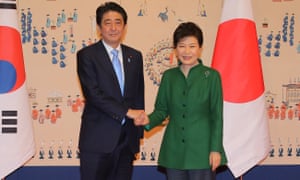The leaders of Japan and South Korea have lifted bilateral relations out of the deep freeze at their first summit together, vowing to resolve disputes over wartime history and counter North Korea’s nuclear threat.
Japan’s prime minister, Shinzo Abe, and the South Korean president, Park Geun-hye, met in Seoul a day after after holding talks with the Chinese premier, Li Keqiang, aimed at relieving regional tensions over historical and territorial rows.
It was the first time Abe and Park had met since they took office, in late 2012 and early 2013 respectively.
Park had previously rebuffed Japanese requests for talks in a show of anger at what she and many other South Koreans see as Abe’s attempts to play down Japan’s wartime conduct in Asia.
Monday’s discussions were dominated by the Japanese military’s use of tens of thousands of young Korean women as sex slaves before and during the second world war.
Abe has upheld official apologies issued by previous Japanese prime ministers, but he has angered China and South Korea by claiming that the “comfort women” were not forced to work in frontline brothels during Japan’s 1910-45 colonial rule over the Korean peninsula.
On Monday, the two leaders agreed to resolve the comfort women dispute – described by Park as the “biggest stumbling block” to friendlier ties – but did not offer details of how that might be achieved.
“I hope today’s summit will heal the bitter history in a broad sense and be a sincere one and an important opportunity to develop the two countries’ relationship,” Park told Abe at the start of their meeting at the presidential Blue House in the South Korean capital.
Abe said he and Park had agreed to speed up talks on the wartime sex slaves but added that he wanted bilateral relations to be “future-oriented”.
“On the issue of comfort women, I think we shouldn’t leave this obstacle to future generations,” Abe told Park in the meeting, according to Kyodo News. “This year is the 50th anniversary of the normalisation of [Japan-South Korea] relations. Keeping that in mind, we have agreed to accelerate talks for the earliest possible resolution.”
Abe and other conservative politicians are irritated by repeated South Korean demands for a fresh apology and compensation. Japan maintains that all compensation claims were settled by the countries’ 1965 diplomatic treaty, and that the Abe administration stands by a 1993 government apology issued by the then chief cabinet secretary, Yohei Kono.
Although little of substance emerged from Monday’s meeting or the trilateral summit a day earlier, the talks represent a breakthrough of sorts for the three countries, whose strong trade ties have been tainted by testy diplomatic relations.
The last bilateral summit between the leaders of South Korea and Japan took place in May 2012, when Lee Myung-bak met Yoshihiko Noda.
In a joint statement issued on Sunday, China, Japan and South Korea agreed to resolve wartime issues by “facing history squarely and advancing toward the future”. Beijing and Tokyo also agreed to resume their high-level economic dialogue next year, after a six-year gap.
While Abe and Park have met at multilateral forums – most recently during an informal meeting organised by President Obama in the Hague a year ago – Washington has increased pressure on the leaders to hold more substantial talks, amid concern over North Korea’s nuclear weapons programme and Beijing’s military buildup in the South China Sea.
Abe reportedly told Park that he was concerned by Chinese naval activity in the region, adding that he wanted to cooperate with South Korea and the US to ensure freedom of navigation.
Last week, a US guided-missile destroyer sailed within 12 nautical miles of one of China’s man-made islands in the area, prompting an angry response from Beijing. Despite Japan’s support for the move, its defence minister, Gen Nakatani, has said Tokyo has no plans to join US patrols near the disputed Spratly archipelago.
Chinese foreign ministry spokeswoman Hua Chunying said Abe need not be concerned, since Chinese activity in the area had not threatened freedom of navigation.
“We hope the relevant countries can all view the present issue objectively, fairly and rationally, and work with China in playing a constructive and responsible role in truly safeguarding the peace and stability of the South China Sea region,” she told reporters in Beijing.




